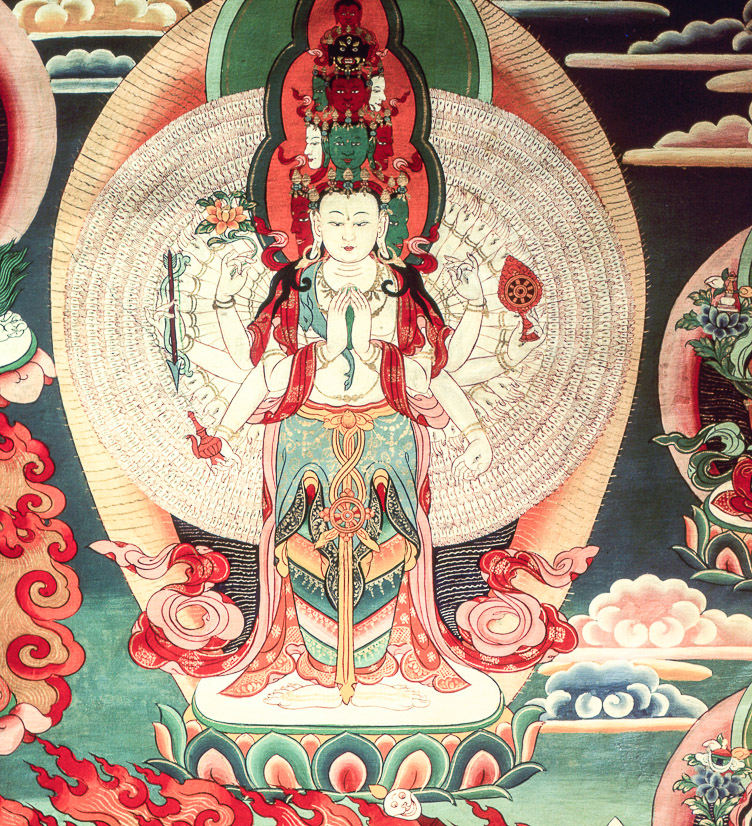Before moving into the analysis of Blake’s 4th plate, The Voice of the Devil, we will explore one of the most important teachings of Buddha in The Heart Sutra, emptiness.
“Form is emptiness, and emptiness is form,” or the nature of all things being empty is one of the most profound Buddhist teachings. Due to our association of “emptiness” with vacancy or hollowness, it easily becomes “the most misunderstood word in Buddhism” (Richmond, “Emptiness: The Most Misunderstood Word in Buddhism). The meaning of emptiness is “things do not exist the way our grasping self supposes they do,” and “nothing we see or hear stands alone; everything is a tentative expression of one seamless, ever changing landscape” (Richmond, “Emptiness: The Most Misunderstood Word in Buddhism). If we recollect on the dual nature of the body and soul Blake adamantly critiques Swedenborg on, we can see that the body alone cannot exist without the soul, and the soul without the body cannot exist either. There is no permanency or fixed identity within us, and once we realize that the fear of losing something is a consequence us clinging to it, detachment opens the way for liberation.
The Heart Sutra tells the story of Bodhisatva Avalokitesvara , “one whose essence (sattva) is perfect wisdom (bodhi),” yet “voluntarily renounces [nirvana] and returns to the world to make it available to others” (Smith, 84).
Before we further examine The Voice of the Devil, Blake makes an interesting decision by having his audience receive this text from the Devil. Again, we see a critique of the prophetic nature that Swedenborg had consummated through the New Jerusalem Church, yet failed to correctly predict or fulfill on various accounts. Additionally, I also see this choice as a deliberate alteration from a traditional way of thinking reflective of Milton’s Paradise Lost, and an element of surprise to get the reader to question and consider the source and content being given. Like Buddhism, it is not the external Blake is asking us to change in The Marriage of Heaven and Hell, but rather our own self. By creating these opportunities for us to be discomforted, we realize that we struggle to hold onto our worldview because we are reluctant to look within ourselves for the truth, but rather to the truth of others.
In this poem, Blake suggests that religious doctrines as established institutions have resulted in three errors drawn attention to by the Devil, that “man has two real existing principles, a Body and Soul,” the second “that Energy called Evil is alone from the Body, and that Reason/ called Good, is alone from the Soul,” and lastly, “that God will torment Man in Eternity for/ following his Energies” (Blake 8). This section is very much a critique on the nature of institutionalized religion where we can see a clear division between the physical and spiritual nature of humanity, but also the element of fear used to control believers. In part I see Blake questioning the true nature of how these doctrines affects others, while also calling out the judgmental and prejudicial nature of these methods being emplaced. I not only see Blake revealing how divisive and uncompassionate these doctrines view their followers, but also the nature in which the followers are taught to view themselves.
To counter these three doctrines, Blake presents three different contraries that corollate with the three previous errors, but are seen as true. The first affirms that “man has no Body distinct from his Soul,” the second, “energy is the only life and is from the Body, and/ Reason is the bound of/ outward circumference of energy,” and “energy is eternal delight” (8). Like Buddhism, life is regarded as the “unity of the physical and spiritual” that comes from the “same ultimate universal law or source of life” (“The Oneness of Body and Mind”). The physical and the spiritual share equal importance and are inseparable. Rather than trying to find purpose or meaning from what we think will give us fulfillment, we look to what is already there in our lives to realize that what is truly important has always been within us. This epiphany also comes from an “expansion of awareness,” rather than fear. There are several key devices Blake uses, one having been the discomfort of associating benevolent principles to the Devil, and the other, the mental and self transformation of principles we have held onto. Without one or the other, reason would not be able to function as a means of debating what we view as good and evil. Likewise, the absence of energies, reason would be nonessential with how we evaluate our interactions and their effects. In many circumstances both energies and reason can be wonderful, there is no definite quality they are bound by.
From a Romantic perspective, the unity of the body and soul is what makes us who we are, and what ultimately makes us human – and likewise in Buddhist notions, the unity is the emptiness that resides within us. To realize who we are and what we are is not something that can be simply ignored because of what we have come to believe is good and evil. There is a much deeper connection we can find within ourselves when we do not choose to put limitations. From Blake’s own personal experience I feel that part of knowing who you are is being able to think for yourself, and to realize that reason, energies, the body, and soul are all a part of each other because they are a part of you.
